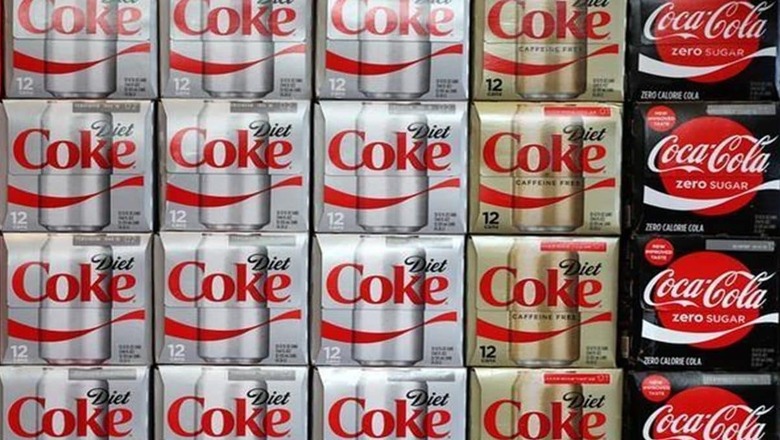
views
Aspartame, a popular artificial sweetener used in diet coke among other things, is most likely to be declared as a “possible carcinogen” by the World Health Organization’s (WHO) cancer research agency.
In a report, news agency Reuters quoted sources saying that the sweet additive, which is used in products ranging from Coco-Cola diet sodas to Mars Extra chewing gum will be listed as “possibly carcinogenic to humans” by the International Agency for Research on Cancer (IARC) by in July 2023.
This will be the first that a leading global health body will do so, sources who had knowledge of the process told Reuters.
Exclusive: Aspartame, one of the world’s most common artificial sweeteners, is set to be declared a possible carcinogen next month by a leading global health body, pitting it against the food industry and regulators https://t.co/7Jv2XiJmAU pic.twitter.com/8bKuC53BMx— Reuters (@Reuters) June 29, 2023
What is the artificial sweetener aspartame?
Aspartame is an artificial sweetener commonly used as a sugar substitute in several food and beverage products.
It was discovered, by accident, by James M Schlatter, a chemist at the American pharmaceutical company G D Searle & Co in 1965.
The sweet additive was approved by the US Food and Drug Administration (FDA) in 1981.
Aspartame has been rigorously studies for several years, and was previously declared safe for consumption at the current levels.
What is the WHO saying about it?
Aspartame’s harm will be determined in an IARC ruling set to take place. There has been numerous studies done on the product and a conclusion on its possible links of cancer will be done based on all the publish evidence.
This analysis of the artificial sweetner has come from a committee of WHO known as the Joint WHO and Food and Agriculture Organization’s Expert Committee on Food Additives (JECFA).
JECFA, which is currently reviewing the use of Aspartame, is set to announce its findings to public on July 14.
What had WHO earlier said on aspartame?
JECFA had in 1981 said that aspartame is safe to consume as long as it is in an acceptable daily limit.
It also said that an adult male weighing 60 kg would have to drinks between 12 to 36 cans of diet soda to be at risk.
How could WHO’s new findings on aspartame help?
The JECFA findings, according to Reuters sources, could be the “first fundamental step to understand carcinogenicity”.
It could show how the sweet additive can determine the probability of a specific type of harm, in this case cancer, can occure under certain conditions and under certain levels of exposures.
Cancer studies and aspartame
In 2022, an observational study in France among 100,000 adults showed that people who consumed larger amounts of artificial sweeteners – including aspartame – had a slightly higher cancer risk than those who don’t. However, this study could not prove that the additive caused cancer.
In another study in the early 2000s, the Ramazzini Institute in Italy reported some cancers in mice and rats that consumed aspartame. But, questions have been raised about the methodology of the second study, Reuters said.
How has the food industry reacted?
The IARC’s decisions has come under scrutiny in the past and has impacted food manufactures in a massive way.
Their announcements led to alarms among the consumers and the reduction in demand is observed after such declarations.
“IARC is not a food safety body and their review of aspartame is not scientifically comprehensive and is based heavily on widely discredited research,” Frances Hunt-Wood, the secretary general of the International Sweeteners Association (ISA), said, Reuters reported.
IARC has come under spotlight for misleading consumers and causing major upheavals for food companies.

















Comments
0 comment